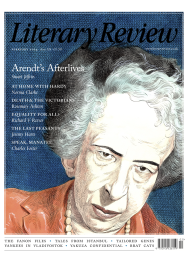Craig Clunas
The Light of Asia: A History of Western Fascination with the East
The Light of Asia: A History of Western Fascination with the East
By Christopher Harding
Allen Lane 464pp £30
A recurring sketch in the BBC comedy show Goodness Gracious Me, on television a quarter of a century ago now, involves Sanjeev Bhaskar clad in the robes, long hair and long beard that mark out a purveyor of the timeless wisdom of the East. Surrounded by a circle of earnest Western admirers, he spouts repurposed pop-culture fragments, solemnly presenting the lyrics of ‘Bohemian Rhapsody’, for example, as a Sanskrit epic. His audience, and therein lies the gag, have no idea that they are being had.
Popular culture doesn’t get much of a look-in throughout Christopher Harding’s new, lengthy and rather solemn study of what he chooses to call the ‘Western fascination with the East’. True, Beatle and ‘working-class mystic’ George Harrison flits in and out of the book’s later sections, but ‘Western fascination’ here doesn’t encompass artefacts like Gilbert and Sullivan’s much-loved The Mikado, not to mention the forgotten musical A Chinese Honeymoon, the single biggest stage hit of Edwardian London. What we get instead is principally a well-researched, well-written, but somewhat problematic account of certain Westerners’ involvement with certain religious traditions of certain bits of Asia. Its strengths and weaknesses probably depend on the reader’s prior investment in the topics it covers, and in their willingness to take seriously the spiritual aspirations of its leading figures – easier to do for some than for others.
This is a book of three parts, running in a straight and lucid chronology, the parts getting longer as we draw nearer the present day. First comes ‘Antiquity to 1600’. This is pretty much an exercise in rounding up the usual suspects: Alexander the Great, Marco Polo, Christopher Columbus, the

Sign Up to our newsletter
Receive free articles, highlights from the archive, news, details of prizes, and much more.@Lit_Review
Follow Literary Review on Twitter
Twitter Feed
The dropping of the atomic bomb on Hiroshima in August 1945 has long been regarded as a historical watershed – but did it mark the start of a new era or the culmination of longer-term trends?
Philip Snow examines the question.
Philip Snow - Death from the Clouds
Philip Snow: Death from the Clouds - Rain of Ruin: Tokyo, Hiroshima, and the Surrender of Japan by Richard Overy
literaryreview.co.uk
Coleridge was fifty-four lines into ‘Kubla Khan’ before a knock on the door disturbed him. He blamed his unfinished poem on ‘a person on business from Porlock’.
Who was this arch-interrupter? Joanna Kavenna goes looking for the person from Porlock.
Joanna Kavenna - Do Not Disturb
Joanna Kavenna: Do Not Disturb
literaryreview.co.uk
Russia’s recent efforts to destabilise the Baltic states have increased enthusiasm for the EU in these places. With Euroscepticism growing in countries like France and Germany, @owenmatth wonders whether Europe’s salvation will come from its periphery.
Owen Matthews - Sea of Troubles
Owen Matthews: Sea of Troubles - Baltic: The Future of Europe by Oliver Moody
literaryreview.co.uk